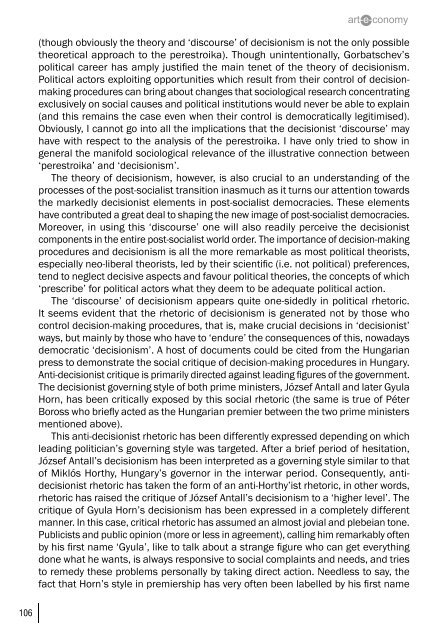art-e-conomy _ reader - marko stamenkovic
art-e-conomy _ reader - marko stamenkovic
art-e-conomy _ reader - marko stamenkovic
Create successful ePaper yourself
Turn your PDF publications into a flip-book with our unique Google optimized e-Paper software.
106<br />
(though obviously the theory and ‘discourse’ of decisionism is not the only possible<br />
theoretical approach to the perestroika). Though unintentionally, Gorbatschev’s<br />
political career has amply justified the main tenet of the theory of decisionism.<br />
Political actors exploiting opportunities which result from their control of decisionmaking<br />
procedures can bring about changes that sociological research concentrating<br />
exclusively on social causes and political institutions would never be able to explain<br />
(and this remains the case even when their control is democratically legitimised).<br />
Obviously, I cannot go into all the implications that the decisionist ‘discourse’ may<br />
have with respect to the analysis of the perestroika. I have only tried to show in<br />
general the manifold sociological relevance of the illustrative connection between<br />
‘perestroika’ and ‘decisionism’.<br />
The theory of decisionism, however, is also crucial to an understanding of the<br />
processes of the post-socialist transition inasmuch as it turns our attention towards<br />
the markedly decisionist elements in post-socialist democracies. These elements<br />
have contributed a great deal to shaping the new image of post-socialist democracies.<br />
Moreover, in using this ‘discourse’ one will also readily perceive the decisionist<br />
components in the entire post-socialist world order. The importance of decision-making<br />
procedures and decisionism is all the more remarkable as most political theorists,<br />
especially neo-liberal theorists, led by their scientific (i.e. not political) preferences,<br />
tend to neglect decisive aspects and favour political theories, the concepts of which<br />
‘prescribe’ for political actors what they deem to be adequate political action.<br />
The ‘discourse’ of decisionism appears quite one-sidedly in political rhetoric.<br />
It seems evident that the rhetoric of decisionism is generated not by those who<br />
control decision-making procedures, that is, make crucial decisions in ‘decisionist’<br />
ways, but mainly by those who have to ‘endure’ the consequences of this, nowadays<br />
democratic ‘decisionism’. A host of documents could be cited from the Hungarian<br />
press to demonstrate the social critique of decision-making procedures in Hungary.<br />
Anti-decisionist critique is primarily directed against leading figures of the government.<br />
The decisionist governing style of both prime ministers, József Antall and later Gyula<br />
Horn, has been critically exposed by this social rhetoric (the same is true of Péter<br />
Boross who briefly acted as the Hungarian premier between the two prime ministers<br />
mentioned above).<br />
This anti-decisionist rhetoric has been differently expressed depending on which<br />
leading politician’s governing style was targeted. After a brief period of hesitation,<br />
József Antall’s decisionism has been interpreted as a governing style similar to that<br />
of Miklós Horthy, Hungary’s governor in the interwar period. Consequently, antidecisionist<br />
rhetoric has taken the form of an anti-Horthy’ist rhetoric, in other words,<br />
rhetoric has raised the critique of József Antall’s decisionism to a ‘higher level’. The<br />
critique of Gyula Horn’s decisionism has been expressed in a completely different<br />
manner. In this case, critical rhetoric has assumed an almost jovial and plebeian tone.<br />
Publicists and public opinion (more or less in agreement), calling him remarkably often<br />
by his first name ‘Gyula’, like to talk about a strange figure who can get everything<br />
done what he wants, is always responsive to social complaints and needs, and tries<br />
to remedy these problems personally by taking direct action. Needless to say, the<br />
fact that Horn’s style in premiership has very often been labelled by his first name


